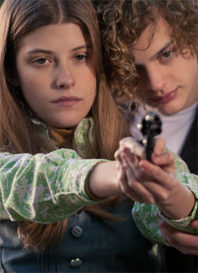
Luis Ortega gives his protagonist a name – Carlitos (Lorenzo Ferro), a person that some people know as Carlos Robredo Puch. Puch, by the way, is serving the longest prison term in Argentine history. And Ortega’s El Angel shows what got him here.
Ortega offers us a characters study, but that’s only true to a certain extent. He also contextualizes Carlitos as someone who developed as a sociopath in 1970s Argentina’s stratified society. He doesn’t justify Carlitos’ actions but he gives a definite answer that it’s about nurture.
The movie also takes a look at his accomplices when he was a thief, like Ramon (Chino Darin). The more houses they hit, the more they bond, and even their conversations and scenes are unapologetic in their queerness.
Another benefit of Ortega’s collaboration with Ferro is the way they shape Carlitos’ criminal activities. There aren’t a lot of those scenes anyway, which makes the movie surprisingly less gratuitous. And when they’re on screen there’s something deliberate in Carlitos’ murderous actions.
Ortega also reveals the homophobia within the criminal community in Argentina, which duh. Besides, the relationship between criminals and the LGBT community seem complex here. The microaggressions that Carlitos faces would seem like a cheap ploy for sympathy but not here.
Using pastel palettes and problem patterns adds colour to the film. Again, its tightrope walk to glorifying Carlitos would make this movie everything that I would normally hate. But its commitment to irreverence makes for a dangerous yet palatable piece of cinema.
- Release Date: 9/6/2018

